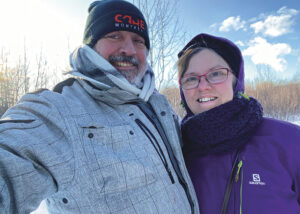The ideal time for planting a church is likely not the middle of a pandemic, but Josh and Cindy Wallace have discovered that it can be done.
“We sort of left everything behind on the premise of a house church,” says Cindy.
In 2019, Josh resigned as pastor of Warman (Sask.) Mennonite, where he had served for seven years. The couple moved to Saskatoon, where Cindy is an English professor at St. Thomas More College.
“We were envisioning a weekly gathering for worship and another [mid-week] meal-based gathering,” she says.
But when COVID-19 arrived, they were forced to change their plans and meet online via Zoom. The Wallaces and three other households meet virtually each Sunday afternoon.
While others have expressed interest in participating, Cindy says that, for some, joining an online platform is “one step too far.”
“It’s kind of a lot to attend a tiny church gathering,” she admits.
Josh agrees, noting that, with such a small group, there is vulnerability and a feeling of exposure. “You can’t hide in the back,” he says.
Worship services follow the same format each week. The group uses a liturgy, which they share on screen and read aloud together. Instead of a sermon, they have a discussion. Members share their needs with one another but are also encouraged to share their gifts.
“The whole format is intended to foster community,” says Cindy.
And it has done just that, in tangible ways, like delivering care packages and loaning vehicles, but also in less tangible ways, such as praying for one another.
“I had some hard health moments,” says Cindy. “These people prayed for me in ways that were genuinely life-giving. . . . Receiving that prayer has been transformative.”
Josh has appreciated fellow group members’ willingness to be vulnerable, and has valued their monthly celebration of communion—sometimes with just a juice box and crackers. “I have found that to be really sustaining,” he says.
Early in 2021, the group developed a list of five core commitments designed to guide the community’s formation. (See sidebar below).
Since then, says Josh, “we’ve been thinking about what [those commitments] mean for our individual lives.”
“We’ve done really intentional work around who we are and who we want to be,” says Cindy. “We don’t know what the next months will look like in terms of re-opening, but we have hopes around more embodied hospitality.”
Although the church is tiny and doesn’t yet have a name, they are open to others joining them.
“We want to be a space for people who haven’t found comfort in the larger church,” says Cindy. “All of the people in the group are keen to make space for people who have been wounded by the church, for folks on the edges of church life.”
Josh thinks there is a certain appeal to being part of a small house church. “It doesn’t have the high bar of entering a church building,” he says. “It isn’t going somewhere to hear a sermon or to see a beautiful music performance; it’s more like having someone over for a cup of coffee.”
Yet growing their church is not the Wallaces’ ultimate goal.
“Even if we weren’t to grow beyond four households, I wouldn’t feel like we were necessarily failing as a church,” says Josh. “I don’t think you have to have ‘x’ many people to be a church.”
For people who feel God may be calling them to plant a church, the Wallaces offer words of encouragement.
“Just about anybody could do this,” Josh says. “You have to have a Zoom link, agree on a passage of the Bible to talk about, agree to share one another’s needs and gifts, and have some way to help your kids grow up to be like Jesus.”
And Cindy says, “Keep things simple and pray for people to come into your life with a shared interest,” adding, “That’s a prayer that I’ve never not had answered.”
Although the Wallaces don’t know what their church will look like in the future, they are confident of God’s guidance.
“When we let the church be what it needs to be, the Spirit is at work,” says Cindy. And they have already seen God’s Spirit at work in their small group. “The gift of God’s presence has shown up in this gathering of people,” she says.
Five core commitments
Joining Jesus in God’s work of renewing all things, we are committed to the following practices:
1. Prayer
In regular rhythms of personal and corporate prayer, we seek to meet and worship God, offering the world’s suffering, wounds, joys and praise.
2. Hospitality
We give and receive hospitality as hosts and as guests, sharing our time, homes, food, finances, attention and various other resources with one another and our neighbours.
3. Simplicity and humility
We give up power or prestige to seek righteousness and justice and the kin(g)-dom of God, practising humility and curiosity as we seek to remain open to learning from others, asking questions, and continually shifting and growing.
4. Justice and mercy
As members of Jesus’ body, we take part in God’s work of bringing together and healing all who have been wounded, abused, pushed aside, or taken advantage of by personal and structural violence, prejudice and injustice. We commit to taking part in Jesus’ work for decolonial, racial, gender and ecological shalom and the flourishing of all creation.
5. Creativity and celebration
By design and by surprise, we choose to celebrate every scrap and hint of what is good, beautiful, and true. Even in the midst of hurt and death, we join in diverse ways in God’s resurrection creativity, growing life, beauty, joy, and rest.
Do you have a story idea about Mennonites in Saskatchewan? Send it to Donna Schulz at sk@canadianmennonite.org.








Leave a Reply
You must be logged in to post a comment.